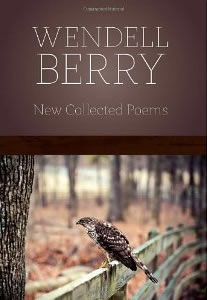Book Notes
 Wendell Berry, New Collected Poems (Berkeley: Counterpoint, 2012), 391pp.
Wendell Berry, New Collected Poems (Berkeley: Counterpoint, 2012), 391pp.
Wendell Berry was born in 1934 to a family that had farmed Kentucky land for five generations. After studies and travels took him to the University of Kentucky, Stanford, France, Italy, and the Bronx, in 1965 he bought his own farm near his birth place. He's been been tilling the earth and churning out books ever since then. Over fifty books of poetry, novels, essays, and short stories have earned him numerous awards as one of the leading truth-tellers of our day. The present volume collects under one cover 266 poems that were previously published in eleven different books from 1964 to 2010 (including all eleven of his Mad Farmer poems). It is dedicated to his beloved Tanya, to whom he has been married since 1957.
Berry's poems are about the land and localism, our necessary and natural connection to the earth, its seasons of life and death, and how this power of place rightly shapes one's life. For the most part, though, modern society has separated us from any sense of nature and place, and so the poems of the curmudgeonly Berry find their power in his contrariness to the zeitgeist. Economic plunder, the imperative of technology, environmental degradation, military violence, and political power have corroded our communities and shriveled our souls. "I am done with apologies," he writes in The Contrariness of the Mad Farmer. "If contrariness is my inheritance and destiny, so be it." In his Questionnaire he invites us to answer a few questions:
1. How much poison are you willing
to eat for the success of the free
market and global trade? Please
name your preferred poisons.
2. For the sake of goodness, how much
evil are you willing to do?
Fill in the following blanks
with the names of your favorite
evils and acts of hatred.
3. What sacrifices are you prepared
to make for culture and civilization?
Please list the monuments, shrines,
and works of art you would
most willingly destroy.
4. In the name of patriotism and
the flag, how much of our beloved
land are you willing to desecrate?
List in the following spaces
the mountains, rivers, towns, farms
you could most readily do without.
5. State briefly the ideas, ideals, or hopes,
the energy sources, the kinds of security,
for which you would kill a child.
Name, please, the children whom
you would be willing to kill.
From this national madness the Mad Farmer "quietly walks away," and "returns to the small country he calls home." This is a smaller place of family and friends, work and rest, blessing and sorrow, woodlands and crops, where one "goes to the care of neighbors, / and into the care of neighbors." In these poetic elegies of a life well-lived he invites us to do the same.


